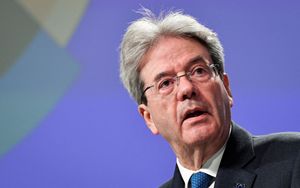(Finance) – The European Commissioner for Economic Affairs, Paul Gentilonistated that “theItaly has a good level of growth in the first quarter of 2023 of 0.6% and can maintain a reasonable level for 2023″. During his speech at the Assonime meeting in Rome, Gentiloni then acknowledged that “the conjuncture economic in which we find ourselves in Europe is better than what we expected last summer, but it is slightly less encouraging than what we expected three-four months ago”.
The growth, he added, “will continue in 2023 but it will be more contained”, underlining that “we had two quarters of stagnation, due to the contraction especially in the first quarter of 2023 of two large European economies, such as Germany and the Netherlands”. The Commissioner then outlined an economic picture “in chiaroscuro, characterized by uncertainty” which is “fueled by the war in Ukraine”. According to the European Commissioner “We cannot consider ourselves outside this uncertainty“, at a time when it is necessary to achieve the objectives of “debt reduction, containment inflation And growth: it’s not easy”.
Speaking then of the policies undertaken by the European Central Bankthe Commissioner underlined that “the tightening of the politics monetary begins to produce a restriction of credit to businesses and households”. “Budget policies can only support the fight against theinflation because we cannot accelerate on the one hand and slow down on the other”, he explained, adding that “inflation is a huge engine of social injustice”.
Precisely in reference to inflation, Gentiloni declared that it “is falling but not enough” and although the “budget policies can only support” the choices of the ECB, to counter it he hoped that there will not be “a return toausterity“. According to the former Italian Prime Minister, “more investment than current expenditure is needed, a gradual elimination of universal measures to deal with the rise in energy prices and the use of common European resources”.
